Elizabeth II’s reign and education: all just a little bit of history repeating?
As Queen Elizabeth II becomes the longest-reigning English monarch, we delve through the TES archives to see how education was reported at the start of her reign – and whether much has changed in the last 63 years...
8th September 2015, 3:52pm
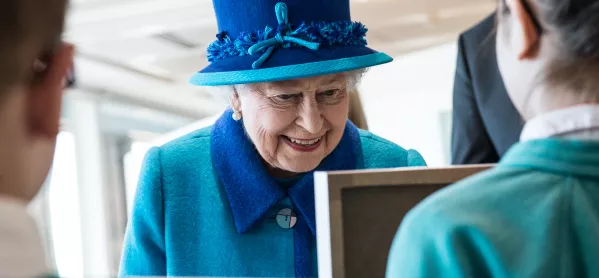
Reading the 8 Feburary 1952 issue of TES is an odd experience. Printed just two days after the death of King George VI, the paper managed to make some presumably last-minute changes to reflect the change in monarch. But around that, you can read education news and opinion that looks downright familiar. Below, we’ve rounded up seven stories that sum up what’s changed and, just as intriguing, what’s remained the same.
- Recruitment crisis
“Why so few teachers?” is a familiar lament in the UK, despite insistence from the DfE that the recruitment crisis is non-existent. But in 1952, this headline was referring to the US sector, which was facing its own recruitment woes. The main deterrents to joining the profession were: “low salaries, long training, little or no chance of advancement, too much responsibility, dull and monotonous aspects of work and restrictions upon personal life”. Sound familiar? It may well do if you have read this week’s TES, in which ATL general secretary Mary Bousted said: “Until the government recognises that teachers’ pay is too low and the impact of constant government-induced policy changes, and does something to improve working conditions, teachers will continue to haemorrhage from our schools.” - The future of education
Schools under austerity measures in 1952 were struggling to meet the demands of the Education Act of 1944 which, among other endeavours, restructured secondary education. “Pioneering is hard enough,” TES complained, “but with crowded classrooms, cramped quarters and penny-wise administrators, the task of forging a new style of education is more formidable than ever.” The government was facing pushbacks on some elements of the Act; TES urged, in particular, “resisting a lowering of the school age to 14”, but also to look at how to evolve the system further, including a never-realised proposal to keep children in primary schools until they were 12.
It’s that sort of pioneering spirit that is needed in 2015, according to educational psychologist Dennis Guiney. Writing in this week’s magazine, he says that schools have become too entrenched in how things have always been done: “Yes, we know all about the brain and learning and the rest, but have we applied any of that knowledge to the school day? No.” Arguing for reforms, such as later start times for teens, he also states that the starting age for schooling should be raised to 6, to allow children more time to develop “social skills, language development and play”.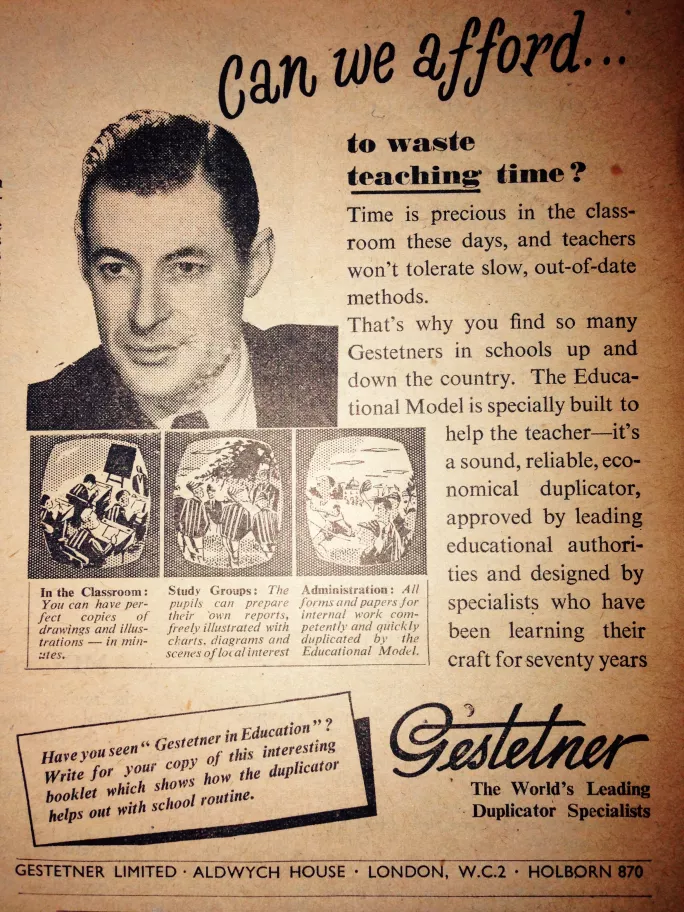
Ed tech, 1952 style. Featuring random man staring into the middle-distance for no reason. Is he asking the question? Is he answering it? Is he even a TEACHER? We may never know. - Opportunities for female students
As the song says: sometimes it’s hard to be a woman. Apparently, at no time was it harder than when Elizabeth II took the throne. “Whatever may be said about equal opportunities, many girls are still at an educational disadvantage,” the TES front page said. “While the boys in some households can settle down to homework or rove at large unhindered, their sisters are disturbed and tied by home responsibilities; at any time a harassed mother, for whom life is becoming daily more difficult, may want them to mind the baby or help with the housework.”
In 2015, it seems girls’ educational struggles have moved from the domestic to the virtual. Teacher Christine Swan says in this week’s issue that “too often, computing and computer science is seen as a boy’s subject. There are these big social barriers we need to break down.”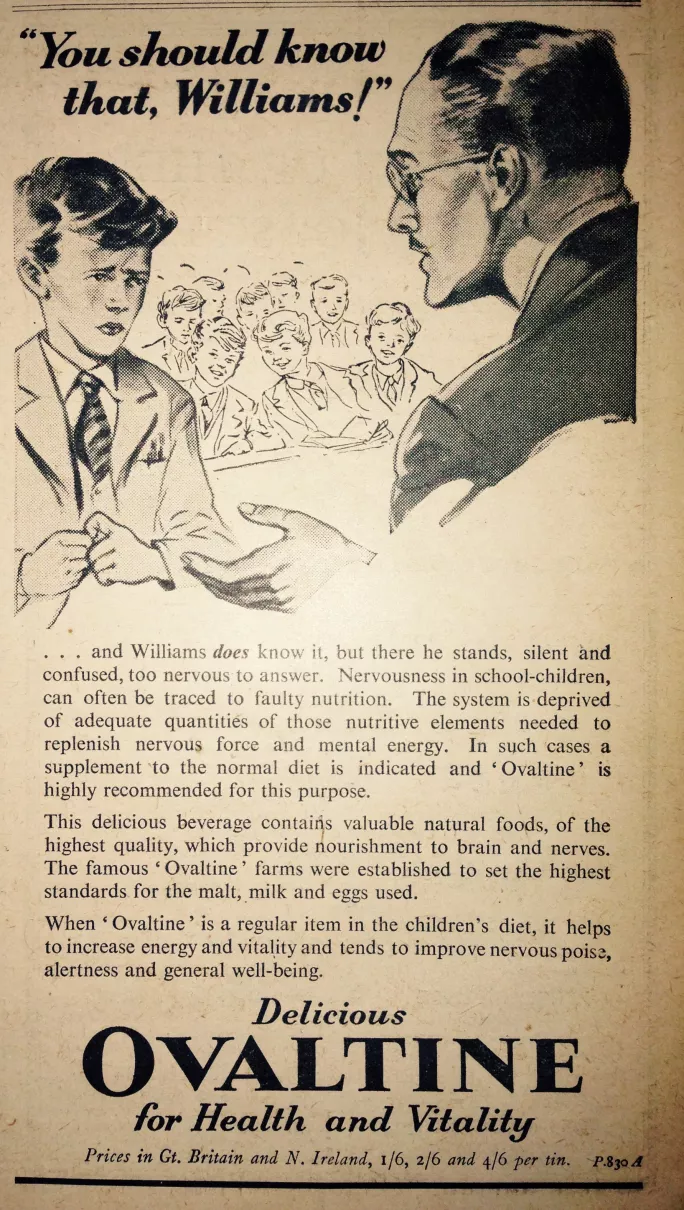
Cheer up, Williams. At least you don’t have to worry about going home to help your ‘harassed’ mother. - Rights and responsibilities
Children knowing their rights today seems like a no-brainer. But back when Elizabeth II took the throne, TES was issuing caution to the notion that primary-aged children could be taught about their human rights, in case it spurred them on to rebel against their teachers. “The rule that no one should be ‘threatened or tricked into joining anything against his will’ will sound like a challenge to civilisation,” the story warns.
In contrast, teachers in 2015 are warning that students need to be reassured that they have freedom of speech. In an article on counter-terrorism, Amanda Brown, assistant general secretary of the NUT, warns that targeting people for being activists sends out the wrong message: “It’s important that young people are able to say ‘I don’t like that’ without feeling that they’re being targeted as saying anything more than that”. - Mental health
Concerns over mental health issues among the young has got to such a stage that the government has appointed a mental health champion for schools. In addition, recent research found that a quarter of students (24 per cent) admitted to having felt suicidal because of bullying. Contrast that with 1952, when TES found it newsworthy that “the annual report of the National Association for Mental Health shows that during 1950-51 the association gave advice to 1,300 applicants for help”.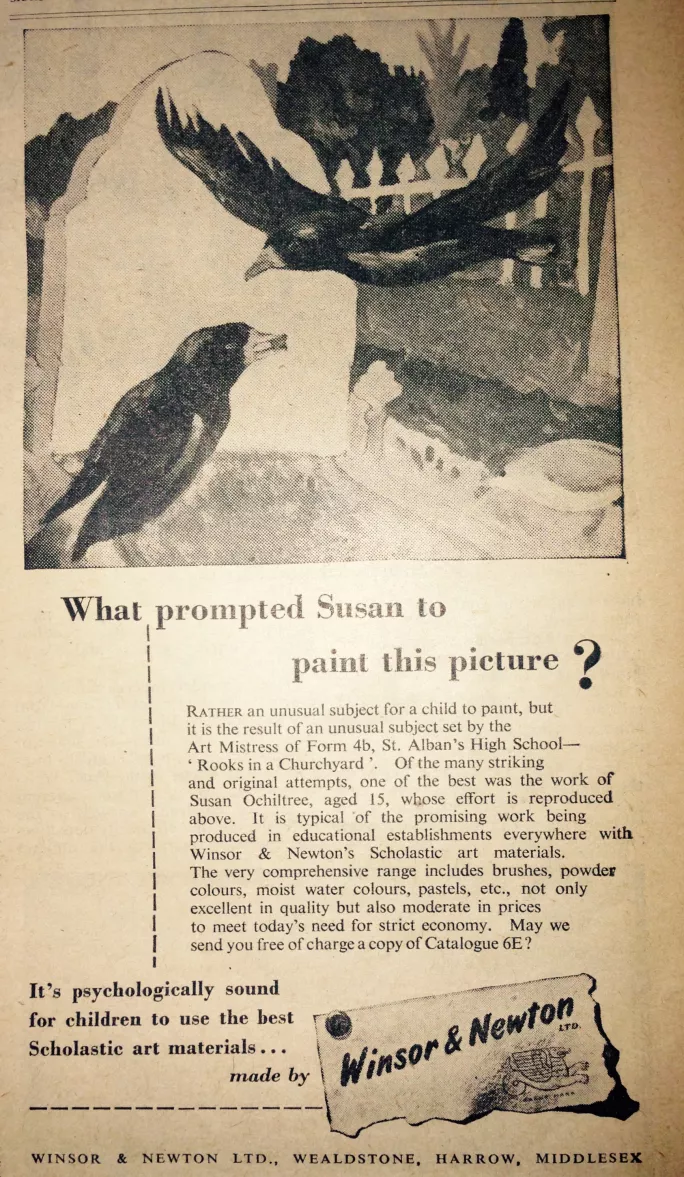
Vincent van Gogh didn’t use Winsor & Newton, and look what happened to him. - Popular culture
Queen Elizabeth’s coronation would help spur television into the mainstream, but prior to that, books and theatre were the order of the day for TES’ cultural reviewers. Writing about the culture of celebrity in a review of Sir John Gielgud’s production of Much Ado About Nothing, the reviewer noted, “Surely it was a romantic heresy which enabled the actor to assume an importance far superior to that of his matter… [Audiences] would swallow unflinchingly the grossest mutilation of dramatic masterpieces so long as the leading actors might make their points.” And in last week’s TES, teacher Carl Hendrick continued such musing as he wondered just how Bad Education, a film starring comedian Jack Whitehall, ever got made. “The gang end up at a huge party at the home of an old friend, who then forces Alfie to teabag a swan. This, like many of the big set-piece gags, is about as funny as… well, it’s just not funny.”
Meanwhile, the books section in 1952 includes a review of ornithological tome One Bird from Another, which the author described as “a surprisingly heretical little book”. Heaven knows what that same reviewer would have made of The Teacher’s Strike, an erotic novel set during the Chicago teachers’ strike, including such lines as “my hands slipped into my boxers as gracefully as a whistling chef could enter a kitchen to work some sizzling magic with wet, raw vegetables”.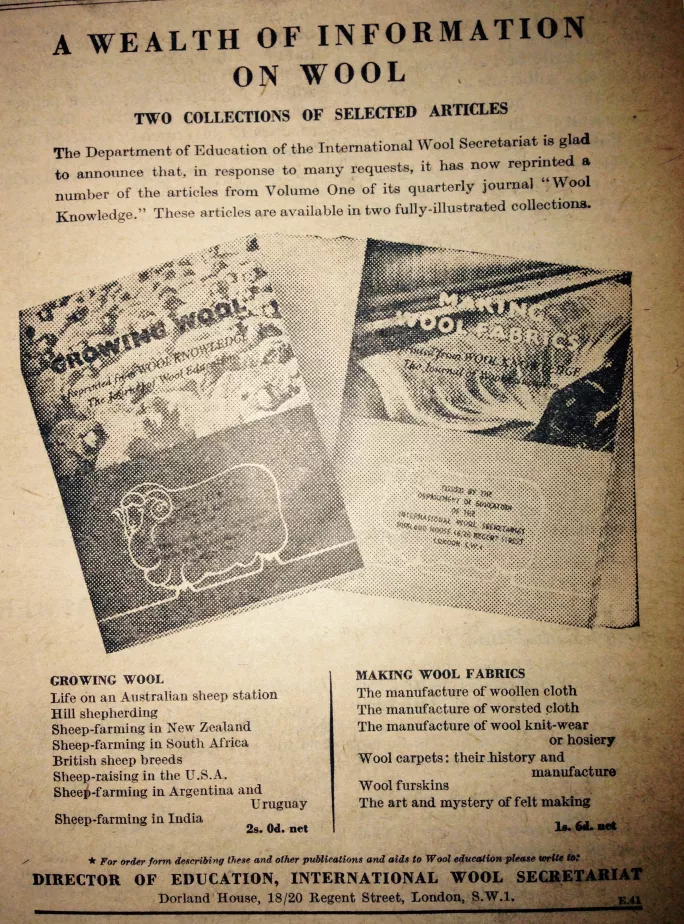
So many questions: there was an International Wool Secretariat? And it was so big and powerful that it required its own Department of Education? And teachers just WOULD NOT STOP bothering them about getting copies of their quarterly journal? And there was enough going on in wool to merit said quarterly journal? - Royalty
It’s just possible (whisper it quietly) that the monarchy is no longer as relevant to everyday life as it once was. But for 1952‘s editorial writers, the very foundation of life itself rested on it. “Teachers are the special guardians of the monarchic tradition,” they write. “The solemn events, a royal funeral and a royal coronation, which will follow in due season are of a kind which will imprint themselves deeply in the minds of the young and this interest wisely directed and stimulated will help to nourish those sentiments on which the survival of nations and civilisations depends.”
Fast-forward 63 odd years, and you can find teacher Mike Stuchbery arguing that kings and queens have a lot to offer teachers. “You would be advised to sit down and take some lessons from the lives of British monarchs… there are lessons that our glorious kings and queens can bequeath to us,” he writes in this week’s edition. But in a nod to a change in the reverence in which the monarchy is held, he doesn’t feel forced to only flatter them, pointing out that Henry VIII “was a miserable, crippled, nigh-incoherent wreck when he died.”
Only time will tell how teachers describe Elizabeth II’s record-breaking reign as part of history lessons in years to come, but it’s probably fair to say that she’ll get a better edit than her Tudor ancestor.
Keep reading for just £1 per month
You've reached your limit of free articles this month. Subscribe for £1 per month for three months and get:
- Unlimited access to all Tes magazine content
- Exclusive subscriber-only stories
- Award-winning email newsletters
Recent
Most read
Most shared



